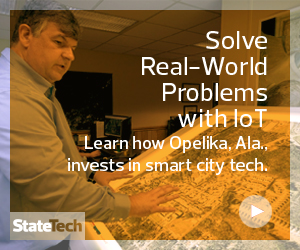What Is Philadelphia’s Smart City Vision?
The city’s smart city planning kicked off about two years ago, and officials realized “there was already a lot that was happening related to this larger strategy around smart cities,” Ellen Hwang, smart city director in the city’s Office of Innovation and Technology, tells Government Technology.
The plan is designed to be locally inspired and focus on “projects that accurately reflect the needs of Philadelphia’s communities and use the unique assets, culture, and existing resources present in the city.”
Philadelphia also vows to be innovative and will grow its “capacity for research, discovery, piloting and evaluation to develop creative solutions to municipal challenges.”
The city will also strive to be equitable and will work to “engage and invest in our diverse communities so that all Philadelphians can benefit from and contribute ideas to smart city activities.”
And the city aims to be collaborative and promises to work on “project development and implementation with stakeholders and partners from government, private sector, startup, civic technology, academia, and local neighborhoods.”
The city argues that a strong governance structure is “arguably the most important foundational element to smart city success” since governance drives collaboration and standardization, which are critical elements in a smart city. Philadelphia’s governance model includes executive leadership, which sets vision and direction; Hwang, who will identify strategic opportunities, drive collaboration and carry out the vision; and an internal working group to collaborate and partners to inform and implement activities.
Philadelphia is also using an external advisory committee — with members from academia, community-based organizations, advocacy groups, the private sector and other organizations — to offer advisory services, research, funding, solutions, and workforce capacity.
MORE FROM STATETECH: Find out how cities can overcome challenges to smart city deployments.
What Comes Next for Philadelphia’s Smart City Plans?
The roadmap does touch on some technology but is mainly about how the city will move forward with its broader plans. “It’s less about physical things and more about how technology and technology infrastructure can actually better support the things that government is supposed to do,” Hwang says.
The plan also lays out a clear governance model with internal subcommittees in areas like data, network and security, and funding. “First, internally, there needs to be a high level of collaboration, and the three subcommittees that we have internally are really about making sure that, from a horizontal perspective, different departments are being represented throughout,” Hwang says.
“So, when we talk about data, network infrastructure, security policies, that’s not just central IT, there are many other departments that need to be a part of that conversation.”
Philadelphia also plans to produce a master data strategy in the next several months, which will “establish the standards for improved data integration across stakeholders and will create the necessary environment for reliable and accurate data analysis and decision-making.”
The city aims to harmonize key data types across the city government “under a cohesive set of policies and standards for the enterprise data layer.”
One project mentioned in the roadmap is the city’s LinkPHL digital kiosks, a pilot run out of the Philadelphia Office of Transportation, Infrastructure and Sustainability. The city plans to deploy 100 kiosks in high-density, high-pedestrian-traffic areas throughout the city, beginning in Center City. The kiosks will provide free high-speed, secure Wi-Fi and other services at no cost to taxpayers or users. The kiosks also offer free mobile device charging; phone calls to anywhere in the U.S., access to municipal and emergency services, maps and directions; and community events, arts and cultural information.
According to Government Technology, 10 of the kiosks will be located in some of the city’s more economically disadvantaged neighborhoods with the hope of introducing free Wi-Fi connection opportunities.
“We’re hoping that by putting these 10 kiosks in certain neighborhoods in Philadelphia, we’re targeting a place where we know that there’s a large digital divide, meaning that there’s low access to the internet at home,” Hwang tells Government Technology.











